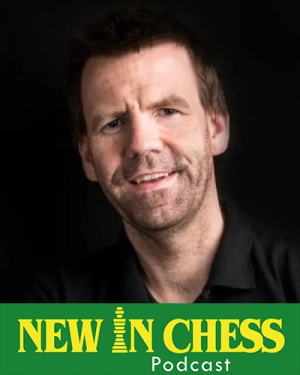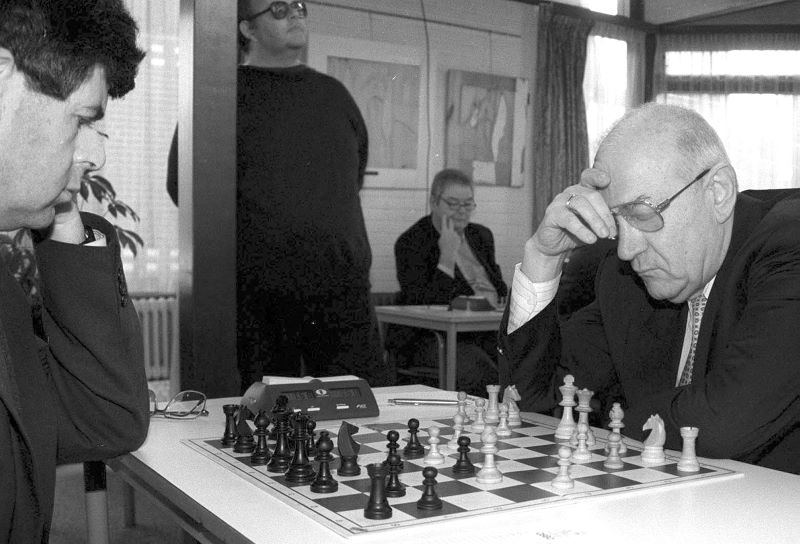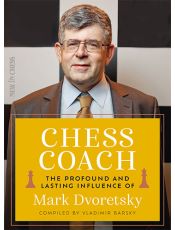
An epic fight
I’ll never forget that day in early February 1999. We, the first team of Apeldoorn, were paired against Rotterdam, the heavy favourites, fighting for the title in the second Dutch league and for promotion to the ‘Meesterklasse’. We lost that match narrowly, and I lost my game too. No, that wasn’t why the day was unforgettable. It was because of the legendary game that took place on first board.
Apeldoorn chess organizer Karel van Delft had asked Mark Dvoretsky, the world’s most famous chess coach and in his prime the strongest International Master on the globe, to play a few games for our ambitious team. Mark had gladly complied – even more so when he heard that in our match with Rotterdam, Viktor Korchnoi would be playing! Dvoretsky wasn’t afraid to face Viktor, who was 67 years old at the time but still quite Terrible. The Muscovite coach saw it as a great opportunity to have a game with this top player whom he’d never crossed swords with before. And now this face-off between two legends of chess was going to take place in my birthplace, Apeldoorn!
Of course, expectations for this game were high. But what actually happened exceeded all expectations. The Korchnoi-Dvoretsky duel was an epic fight, won in impressive style by the veteran on move 87. Korchnoi exerted pressure from the beginning, Dvoretsky defended heroically for many hours, but finally had to surrender after an endgame that contained some quite beautiful points.

‘Applause!’ I wrote in my chess column for the regional newspaper one week later. And I analysed the game, based on the post-mortem which, of course, was witnessed by all the members of the two teams, including Israeli IM and endgame-composing GM Yochanan Afek. By the way, the post-mortem was short since Korchnoi’s team ‘was in a hurry to get to the train’, as Dvoretsky wrote in an article about the event which also contains his 5½-page analysis of this game – which he lost! It is featured in Part IV of the book Chess Coach, a collection of remembrances of Dvoretsky compiled by his friend Vladimir Barsky, now published in English by New in Chess.
Dvoretsky had been staying for several days – maybe even longer than that – at the hospitable home of Van Delft, which was becoming a kind of hub for chess players of all types in those days. I had the privilege of interviewing the Chess Coach there, and I was pleasantly surprised by his friendliness and openness. In fact, I was experiencing what many famous chess players also describe in the book Chess Coach. Dvoretsky was a deeply decent man, an original thinker, and a quite self-willed coach who had his own opinions and was never afraid to vent them, even if it might have dangerous consequences for him. ‘I’ve always had bad relations with authorities,’ he said, and when we talked about Mikhail Botvinnik and his chess school, he didn’t hesitate to call the Patriarch paranoid: ‘He had iron logic but no sense of reality’. Needless to say, such opinions didn’t make his life in the Soviet Union – later Russia – easy, and it may be no exaggeration to describe Dvoretsky’s entire life as ‘an epic fight’.
In the interview, he went on to explain that ‘Know thyself’ was the adage he always adhered to when coaching his pupils, and he handed me another quote that characterized his approach beautifully: ‘A chess position is like an iceberg. The surface conceals an enormous wealth of possibilities.’
That evening and the day of the Korchnoi-Dvoretsky game will remain engraved in my memory. And if you want to read more personal stories about Dvoretsky from more renowned sources, I can heartily recommend our book Chess Coach, the Profound and Lasting Influence of Mark Dvoretsky, in which his most famous pupils as well as several World Champions and many other chess personalities write fondly about him, recollecting wonderful anecdotes and analysing several dozens of Dvoretsky’s best games.
And if you’ve also become fascinated by this unique personality, then don’t forget to listen to this podcast in which GM Jacob Aagaard talks with Dirk Jan ten Geuzendam about his memories of the great Dvoretsky.

